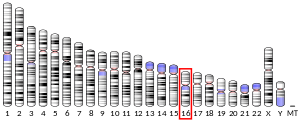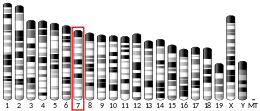VKORC1
The human gene VKORC1 encodes for the enzyme, Vitamin K epOxide Reductase Complex (VKORC) subunit 1.[5] This enzymatic protein complex is responsible for reducing vitamin K 2,3-epoxide to its active form, which is important for effective clotting. In humans, mutations in this gene can be associated with deficiencies in vitamin-K-dependent clotting factors.
Function
The VKORC1 protein is a key enzyme in the vitamin K cycle. VKORC1 is a 163 amino acid integral membrane protein associated with the endoplasmic reticulum and VKORC1 mRNA is broadly expressed in many different tissues. VKORC1 is involved in the vitamin K cycle by reduction of vitamin K epoxide to vitamin K, which is the rate-limiting step in the physiological process of vitamin K recycling.[6] The availability of reduced vitamin K is of importance for activation vitamin K 2,3-epoxide. The reduction of vitamin K epoxide is then responsible for the carboxylation of glutamic acid residues in some blood-clotting proteins, including factor VII, factor IX, and factor X.[5][7] VKORC1 is of therapeutic interest both for its role in contributing to high interpatient variability in coumarin anticoagulant dose requirements and as a potential player in vitamin K deficiency disorders.[8]
Warfarin is a commonly prescribed oral anticoagulant, or blood thinner used to treat blood clots such as deep vein thrombosis and pulmonary embolism and to prevent stroke in people who have atrial fibrillation, valvular heart disease or artificial heart valves.[9] Warfarin causes inhibition on VKORC1 activities and leads to a reduced amount of vitamin K available to serve as a cofactor for clotting proteins.[8] Inappropriate dosing of warfarin has been associated with a substantial risk of both major and minor hemorrhage. As the pharmacological target of warfarin, VKORC1 is considered a candidate gene for the variability in warfarin response. Previous researches have shown that the CYP2C9 genotype of patients also played a role in warfarin metabolism and response.[10]
Gene
The human gene is located on chromosome 16. Two pseudogenes have been identified on chromosome 1 and the X chromosome.
Clinical relevance
In humans, mutations in this gene are associated with deficiencies in vitamin-K-dependent clotting factors. Fatal bleeding (internal) and hemorrhage can result from a decreased ability to form clots.
The product of the VKORC1 gene encodes a subunit of the enzyme that is responsible for reducing vitamin K 2,3-epoxide to the activated form, a reduction reaction. A genetic polymorphism on the VKORC1 gene results in a patient having less available VKORC enzyme to complete this reaction.
Specifically, in the VKORC1 1639 (or 3673) single-nucleotide polymorphism, the common ("wild-type") G allele is replaced by the A allele. People with an A allele (or the "A haplotype") produce less VKORC1 than do those with the G allele (or the "non-A haplotype"). The prevalence of these variants also varies by race, with 90%-95% of Asians, 37% of Caucasians and 14% of Africans carrying the A allele.[11] The end result is a decreased amount of clotting factors and therefore, a decreased ability to clot.[12]
Warfarin is an anticoagulant that opposes the procoagulant effect of vitamin K by inhibiting the VKORC enzyme. If these patients are prescribed warfarin for another medical purpose, they will require lower doses than usual because the patient is already deficient in VKORC. They may experience severe bleeding and bruising. Lower warfarin doses are needed to inhibit VKORC1 and to produce an anticoagulant effect in carriers of the A allele. Genetic testing can reveal the presence of the genetic mutation and FDA recommends lower starting doses of warfarin in these patients.
Two alternatively spliced transcripts encoding different isoforms have also been described. These isoforms result in warfarin resistance (requiring higher doses) in humans and rats, because the amount and effectiveness of the VKORC enzyme has not changed, but the ability of warfarin to exert its effect (antagonize the enzyme) has changed. These isoform mutations are rare except in Ethiopian and certain Jewish populations.
References
- 1 2 3 GRCh38: Ensembl release 89: ENSG00000167397 - Ensembl, May 2017
- 1 2 3 GRCm38: Ensembl release 89: ENSMUSG00000096145 - Ensembl, May 2017
- ↑ "Human PubMed Reference:".
- ↑ "Mouse PubMed Reference:".
- 1 2 "Entrez Gene: VKORC1 vitamin K epoxide reductase complex, subunit 1".
- ↑ Ryan P., Owen; Li, Gong; Hersh, Sagreiya; Teri E., Klein; Russ B., Altmana (October 2010). "VKORC1 Pharmacogenomics Summary". Pharmacogenet Genomics: 642–644.
- ↑ Garcia AA, Reitsma PH (2008). "VKORC1 and the vitamin K cycle". Vitamins and Hormones. 78: 23–33. doi:10.1016/S0083-6729(07)00002-7. PMID 18374188.
- 1 2 Rost S, Fregin A, Ivaskevicius V, Conzelmann E, Hörtnagel K, Pelz HJ, Lappegard K, Seifried E, Scharrer I, Tuddenham EG, Müller CR, Strom TM, Oldenburg J (February 2004). "Mutations in VKORC1 cause warfarin resistance and multiple coagulation factor deficiency type 2". Nature. 427 (6974): 537–41. doi:10.1038/nature02214. PMID 14765194.
- ↑ "Warfarin Sodium". Drugs.com.
- ↑ Wadelius M, Sörlin K, Wallerman O, Karlsson J, Yue QY, Magnusson PK, Wadelius C, Melhus H (2004). "Warfarin sensitivity related to CYP2C9, CYP3A5, ABCB1 (MDR1) and other factors". The Pharmacogenomics Journal. 4 (1): 40–8. doi:10.1038/sj.tpj.6500220. PMID 14676821.
- ↑ Yamamura M, Yamamoto M (April 1989). "[Tumor metastasis and the fibrinolytic system]". Gan to Kagaku Ryoho. Cancer & Chemotherapy. 16 (4 Pt 2-1): 1246–54. doi:10.1161/CIRCULATIONAHA.107.704023. PMC 2730023. PMID 2730023.
- ↑ Yuan HY, Chen JJ, Lee MT, Wung JC, Chen YF, Charng MJ, Lu MJ, Hung CR, Wei CY, Chen CH, Wu JY, Chen YT (July 2005). "A novel functional VKORC1 promoter polymorphism is associated with inter-individual and inter-ethnic differences in warfarin sensitivity". Human Molecular Genetics. 14 (13): 1745–51. doi:10.1093/hmg/ddi180. PMID 15888487.
Further reading
- Oldenburg J, Bevans CG, Müller CR, Watzka M (2006). "Vitamin K epoxide reductase complex subunit 1 (VKORC1): the key protein of the vitamin K cycle". Antioxidants & Redox Signaling. 8 (3–4): 347–53. doi:10.1089/ars.2006.8.347. PMID 16677080.
- Zhang J, Chen Z, Chen C (September 2016). "Impact of CYP2C9, VKORC1 and CYP4F2 genetic polymorphisms on maintenance warfarin dosage in Han-Chinese patients: A systematic review and meta-analysis". Meta Gene. 9: 197–209. doi:10.1016/j.mgene.2016.07.002. PMC 5006145. PMID 27617219.
- Takeuchi M, Kobayashi T, Brandão LR, Ito S (June 2016). "Effect of CYP2C9, VKORC1, and CYP4F2 polymorphisms on warfarin maintenance dose in children aged less than 18 years: a protocol for systematic review and meta-analysis". Systematic Reviews. 5 (1): 105. doi:10.1186/s13643-016-0280-y. PMC 4917995. PMID 27334984.
- Zhang J, Tian L, Zhang Y, Shen J (November 2015). "The influence of VKORC1 gene polymorphism on warfarin maintenance dosage in pediatric patients: A systematic review and meta-analysis". Thrombosis Research. 136 (5): 955–61. doi:10.1016/j.thromres.2015.09.018. PMID 26433837.
- Czogalla KJ, Watzka M, Oldenburg J (August 2015). "Structural Modeling Insights into Human VKORC1 Phenotypes". Nutrients. 7 (8): 6837–51. doi:10.3390/nu7085313. PMC 4555152. PMID 26287237.
- Shaw K, Amstutz U, Kim RB, Lesko LJ, Turgeon J, Michaud V, Hwang S, Ito S, Ross C, Carleton BC (August 2015). "Clinical Practice Recommendations on Genetic Testing of CYP2C9 and VKORC1 Variants in Warfarin Therapy". Therapeutic Drug Monitoring. 37 (4): 428–36. doi:10.1097/FTD.0000000000000192. PMID 26186657.
- Gaikwad T, Ghosh K, Shetty S (September 2014). "VKORC1 and CYP2C9 genotype distribution in Asian countries". Thrombosis Research. 134 (3): 537–44. doi:10.1016/j.thromres.2014.05.028. PMID 24908449.
- Yang J, Chen Y, Li X, Wei X, Chen X, Zhang L, Zhang Y, Xu Q, Wang H, Li Y, Lu C, Chen W, Zeng C, Yin T (October 2013). "Influence of CYP2C9 and VKORC1 genotypes on the risk of hemorrhagic complications in warfarin-treated patients: a systematic review and meta-analysis". International Journal of Cardiology. 168 (4): 4234–43. doi:10.1016/j.ijcard.2013.07.151. PMID 23932037.
- Fung E, Patsopoulos NA, Belknap SM, O'Rourke DJ, Robb JF, Anderson JL, Shworak NW, Moore JH (November 2012). "Effect of genetic variants, especially CYP2C9 and VKORC1, on the pharmacology of warfarin". Seminars in Thrombosis and Hemostasis. 38 (8): 893–904. doi:10.1055/s-0032-1328891. PMC 4134937. PMID 23041981.
- Jorgensen AL, FitzGerald RJ, Oyee J, Pirmohamed M, Williamson PR (2012). "Influence of CYP2C9 and VKORC1 on patient response to warfarin: a systematic review and meta-analysis". PLoS One. 7 (8): e44064. doi:10.1371/journal.pone.0044064. PMC 3430615. PMID 22952875.
- Johnson JA, Gong L, Whirl-Carrillo M, Gage BF, Scott SA, Stein CM, Anderson JL, Kimmel SE, Lee MT, Pirmohamed M, Wadelius M, Klein TE, Altman RB (October 2011). "Clinical Pharmacogenetics Implementation Consortium Guidelines for CYP2C9 and VKORC1 genotypes and warfarin dosing". Clinical Pharmacology and Therapeutics. 90 (4): 625–9. doi:10.1038/clpt.2011.185. PMC 3187550. PMID 21900891.




